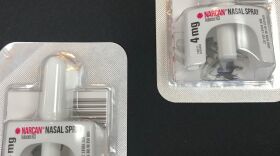As an overdose crisis continues to afflict Philadelphia, debate is heating up over the future of possible supervised injection sites in the city as a possible solution.
"Take Care" spoke with Elana Gordon, reporter and producer for WHYY in Philadelphia and the founding member of their weekly health and science program, The Pulse, about the situation and progress there.
Gordon described supervised injection sites as facilities where healthcare workers can oversee people who bring in their own drugs to inject.
“The idea is that people who are using drugs and injecting, given that there’s such a high level right now of overdoses, that this is a way to prevent those deaths in the event that there is an overdose, or there might be ways to inject in a safer way,” Gordon said.
Currently, such facilities are illegal in the United States, but they are being used in Canada and some European countries. Gordon said proponents of these facilities argue that supervised injection sites help save lives and put users in contact with other healthcare workers for possible treatment in the future.

Those against these facilities pose that it could create a safe harbor for drug users, Gordon said. However, their success in other countries has prompted Philadelphia to seriously consider implementing the system there.
Gordon said Philadelphia, like many cities, has been in the thick of an addiction crisis. Past coverage by WHYY reported that 900 people died of overdose in Philadelphia in 2016. This has prompted a lot of conversations to look at viable solutions to the growing problem.
“There’s a lot of challenges around that, and one of the things that came up during those conversations was safe injection sites,” Gordo said. “This was a really touchy issue—it still is in a lot of ways—but the city recommended last year to look into researching what that would mean.”
The research involved traveling to Canada to examine the injection sites there and see how practical applying one in Philadelphia would be.
Assessments from the trip have shown these facilities cleaned up the neighborhoods where they were implemented and saved a lot of lives. However, Gordon said it would be a new practice for Philadelphia, so there is still a lot of uncertainty as to whether a state site would have the same impact.
“It’s been a really, really contentious conversation,” Gordon said. “There’s a lot of fear and concern over what the impact and implications that would have.”
Coverage from 2017 shows that the concern of "not in my backyard" has been continuously present since the debate started. Supporters argue the crisis is already happening in people's neighborhoods, so injection sites could be a way to clean up people's "backyards."
Gordon said supervised injection sites will not be built in the near future; right now, the idea is only in the conversation phase. Gordon said it is an important option to consider because no solution means the addiction crisis there carries on.
“One thing that we know based on what the data is coming out is that the overdose crisis isn’t going away, and so, this conversation isn’t going away,” Gordon said.





